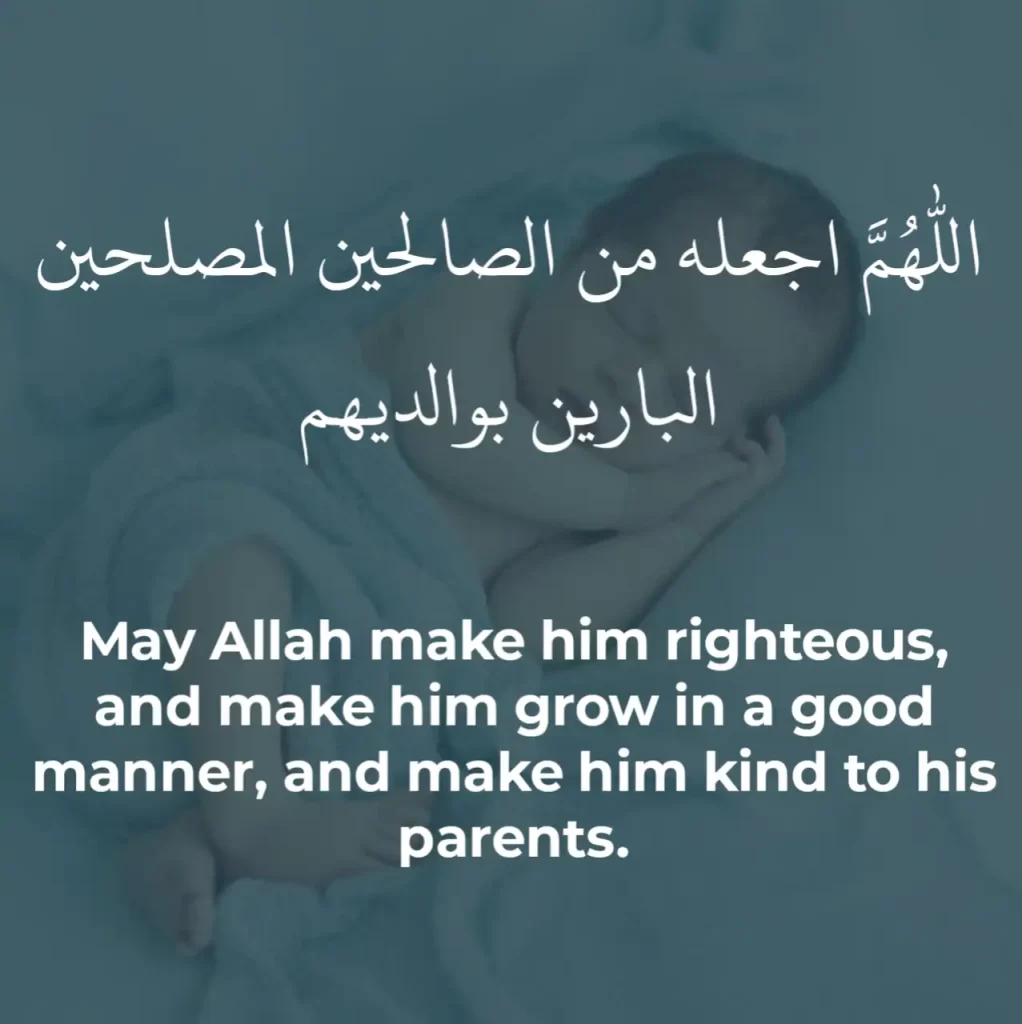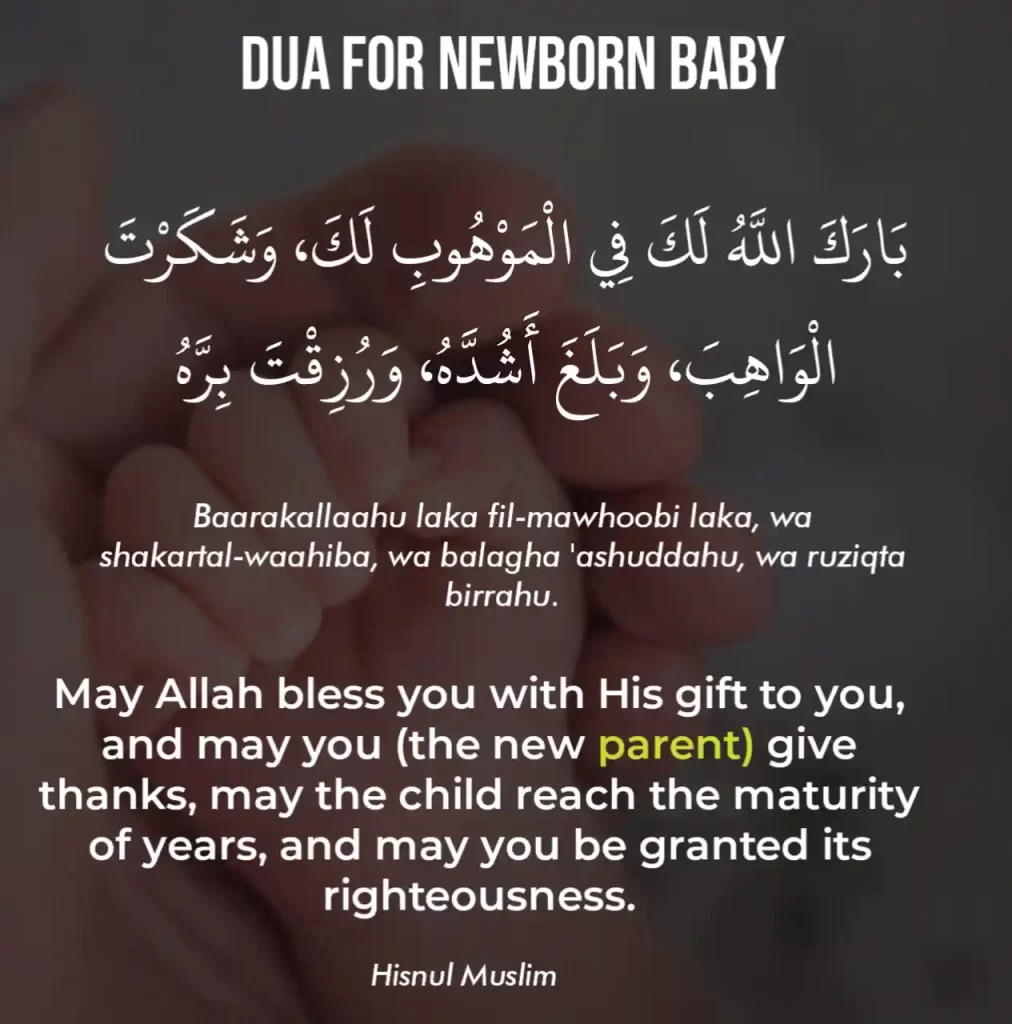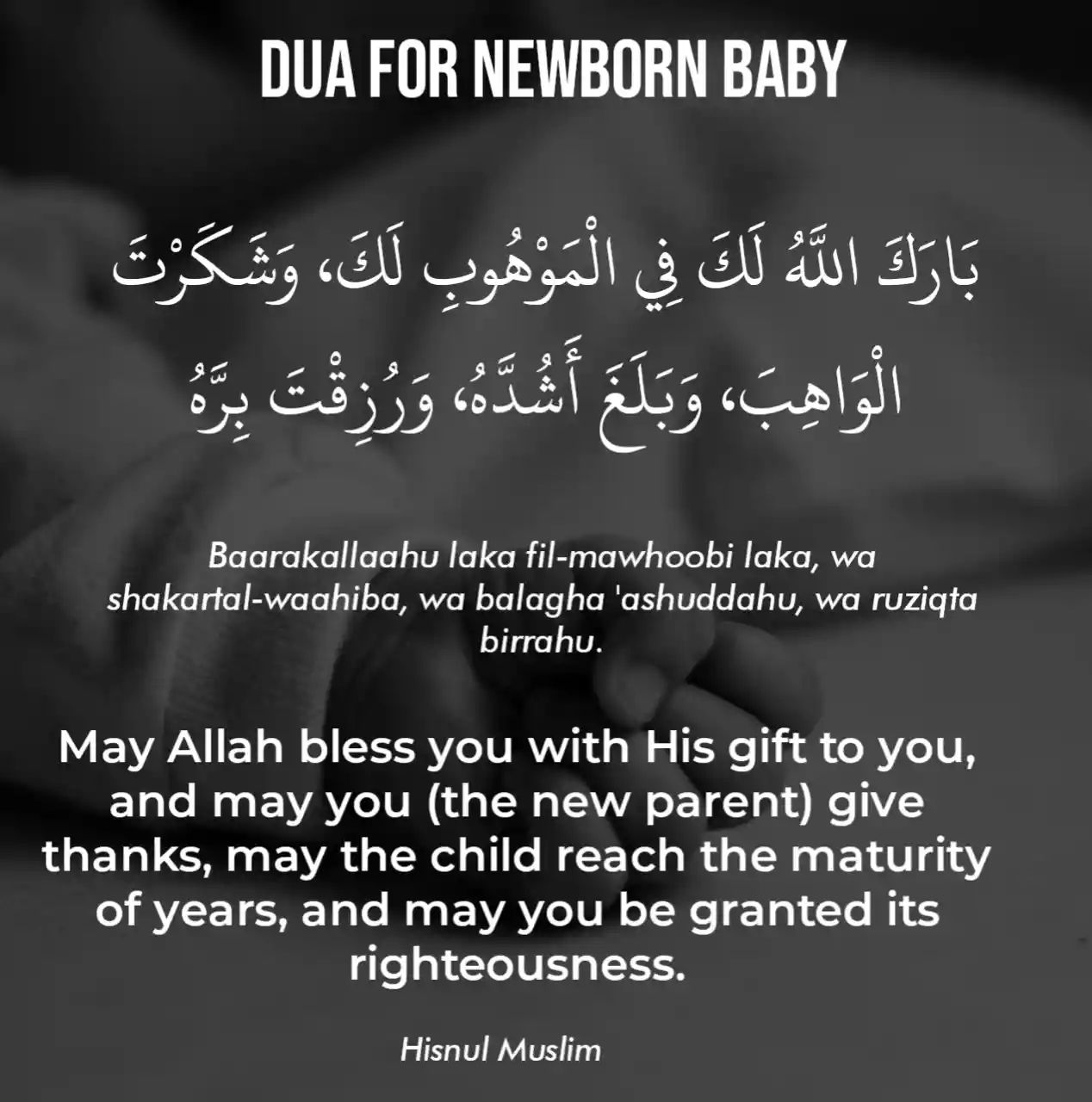Dua For New Born Baby (Congratulations Dua In Arabic and Meaning)
Welcoming a newborn baby into this world is one of the most beautiful and blessed moments in any family’s life. It is a time of joy, celebration, and gratitude for the miracle of life. As parents, we want to ensure that our newborns are safe, healthy, and blessed with the best of everything.
Advertisements
In many cultures and religions, prayers and supplications are offered for the well-being and protection of the newborn and their family.
In Islam, there are duas or prayers that are recited for the newborn baby. These duas not only seek Allah’s protection for the baby but also invoke His blessings and mercy upon the child and the family.
Dua For New Born Baby
There is no specific Dua for newborn baby. But one can recite general duas, such as praying for the newborn to be safe and sound, to be guided, and so on. One of them is:
اللهم اجعله من الصالحين المصلحين البارين بوالديهم
Advertisements
Meaning May Allah make him righteous, and make him grow in a good manner, and make him kind to his parents.
The basic principle concerning the wording of dua (supplication) outside prescribed acts of worship is that there are no restrictions, and the one who is offering supplication may choose whatever supplication he likes and whatever best suits his aim.
The dua refers to the future, in the sense that when he/she grows up and reaches the age of maturity, he/she may be settled in the path of righteousness, lead others in the path of righteousness and be kind to her parents.

- RECOMMENDED READING: 3 Dua For Laziness in Arabic, Transliteration And Meaning In English
The basic principle concerning the wording of du‘a (supplication) outside prescribed acts of worship is that there are no restrictions, and the one who is offering supplication may choose whatever supplication he likes and whatever best suits his aim.
Congratulations Dua For Newborn Baby
No particular format for offering congratulations on the birth of the newborn is proven in the Prophet’s Sunnah.
Advertisements
But, in the book of Hisnul Muslim, the author mentioned this Dua for congratulating new parents and how they should respond it.
The Dua is written in Arabic as:
بَارَكَ اللَّهُ لَكَ فِي الْمَوْهُوبِ لَكَ، وَشَكَرْتَ الْوَاهِبَ، وَبَلَغَ أَشُدَّهُ، وَرُزِقْتَ بِرَّهُ
Advertisements
Transliteration
Baarakallaahu laka fil-mawhoobi laka, wa shakartal-waahiba, wa balagha ‘ashuddahu, wa ruziqta birrahu.
Meaning In English
The Dua means May Allah bless you with His gift to you, and may you (the new parent) give thanks, may the child reach the maturity of years, and may you be granted its righteousness.

This Dua are words narrated from al-Hasan al-Basri. The scholars regarded it as mustahabb (recommended) to offer supplication in the words narrated from al-Hasan al-Basri, as mentioned by Imam an-Nawawi in al-Majmu‘ (8/443) and in al-Adhkar (p. 289), and by Ibn Qudamah in al-Mughni (9/464).
They also regarded it as mustahabb to offer supplication in the words narrated from Ayyub as-Sakhtiyani (may Allah have mercy on him); when he offered congratulations on the birth of a baby, he would say,
“May Allah make him a blessing to you and to the ummah of Muhammad.” (Narrated by Ibn Abi’d-Dunya in al-‘Iyal (no. 202).
The reply of the person being congratulated is to say:
بَارَكَ اللَّهُ لَكَ وَبَارَكَ عَلَيْكَ، وَجَزَاكَ اللَّهُ خَيْراً، وَرَزَقَكَ اللَّهُ مِثْلَهُ، وَأَجْزَلَ ثَوَابَكَ
Transliteration
Baarakallahu laka wa baaraka ‘alayka, wa jazaakallaahu khayran, wa razaqakallaahu mithlahu, wa ‘ajzala thawaabaka.
Meaning In English
May Allah bless you, and shower His blessings upon you, and may Allah reward you well and bestow upon you its like and reward you abundantly.
Reference: Hisnul Muslim: An-Nawawi, Kitdbul-‘Athkarp. 349, and Sahihul-‘Athkar 2/7l3 by Saleem Al-Hilali.
May Allah make all the children of the Muslims a blessing to their parents and to the ummah of Muhammad (blessings and peace of Allah be upon him).
What to do when a baby is born in Islam
There is no action prescribed in Shari`iah for preparing to welcome a new baby a day or two before he is born, as far as we know.
But one can recite general du`as , such as praying for the new born to be safe and sound, to be guided, and so on.
Allah mentioned in His Book the prayer of the righteous woman, the wife of ‘Imran, who said (interpretation of the meaning):
“(Remember) when the wife of ‘Imran said: ‘O my Lord! I have vowed to You what (the child that) is in my womb to be dedicated for Your services (free from all worldly work; to serve Your place of worship), so accept this from me. Verily, You are the All-Hearer, the All-Knowing.’
Then when she gave birth to her [child Maryam (Mary)], she said:
‘O my Lord! I have given birth to a female child,’ — and Allah knew better what she brought forth, — ‘And the male is not like the female, and I have named her Maryam (Mary), and I seek refuge with You (Allah) for her and for her offspring from Shaytan (Satan), the outcast.’”
Aal ‘Imran 3:35-36
There follows an outline of what should be done on the day of the child’s birth, and after that:
1. It is mustahabb to do tahnik for the baby and to pray for him.
Abu Musa said: “I had a baby boy, and I brought him to the Prophet (peace and blessings of Allah be upon him). He named him Ibrahim, did Tahnik with some dates and prayed for Allah to bless him, then he gave him back to me.”
Narrated by al-Bukhari, 5150; Muslim, 2145
Tahnik means putting something sweet, such as dates or honey, in the child’s mouth when he is first born.
2. It is permissible to name the child on the first day or on the seventh.
Anas ibn Malik said: The Messenger of Allah (peace and blessings of Allah be upon him) said: “A boy was born to me this night and I have named him with the name of my father Ibrahim.” (Narrated by Muslim, 3126)
‘Aishah said: the Messenger of Allah (peace and blessings of Allah be upon him) did ‘aqiqah for al-Hasan and al-Husayn on the seventh day, and gave them their names. (Narrated by Ibn Hibban, 12/127; al-Hakim, 4/264. Classed as sahih by al-Hafiz Ibn Hajar in Fath al-Bari, 9/589).
3. ‘Aqiqah
Salman ibn ‘Amir (may Allah be pleased with him) reported that the Prophet (peace and blessings of Allah be upon him) said: “For the boy there should be an ‘aqiqah . Slaughter (an animal) for him and remove the harmful thing [i.e., the foreskin] from him.”
(Narrated by al-Tirmidhi, 1515; al-Nasai, 4214; Abu Dawud, 2839; Ibn Majah, 3164. The hadith was classed as sahih by al-Albani, may Allah have mercy on him, in al-Irwa, 4/396).
Samurah ibn Jundub (may Allah be pleased with him) said: The Messenger of Allah (peace and blessings of Allah be upon him) said:
“A boy is ransomed by his ‘aqiqah . Sacrifice should be made for him on the seventh day, he should be given a name and his head should be shaved.” (Narrated by al-Tirmidhi, 1522; al-Nasai, 4220 and Abu Dawud, 2838. The hadith was classed as sahih by al-Albani, may Allah have mercy on him, in al-Irwa 4/385)
Imam ibn al-Qayyim (may Allah have mercy on him) said:
Among the benefits of ‘aqiqah are:
- It is a sacrifice by means of which the child is brought close to Allah soon after he comes into this world.
- It is a ransom for the newborn; his ‘aqiqah ransoms him so that he can intercede for his parents.
- It is a sacrifice by which the newborn is ransomed just as Allah ransomed Isma’il with the ram. (Tuhfat al-Mawdud, p. 69)
Perhaps another benefit of the ‘aqiqah is the gathering of relatives and friends for the walimah (feast).
4. Adhan and iqamah for newborn
Among the Sunnahs for welcoming the newborn, the scholars mentioned that the Adhan should be recited into the baby’s right ear so that the first thing he hears in this world will be the words of Tawhid, which will have a great and blessed effect on the child.
With regard to reciting the iqamah in the child’s left ear, there is nothing to prove that this is required. (Al-Silsilat al-Da’ifah, 1/491)
We ask Allah to protect us and our children from all evil and to keep them safe and sound in this world and in the Hereafter. May Allah bless our Prophet Muhammad.
And Allah knows best
Advertisements


One Comment